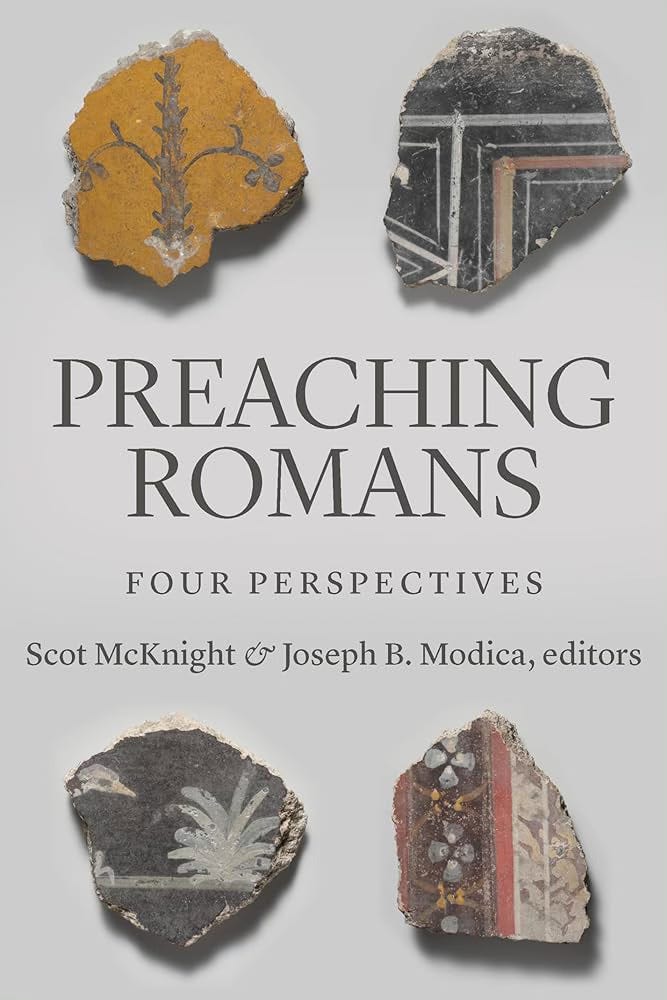I am preaching through Paul’s Letter to the Romans this summer. The last time I gave sustained homiletic attention to the epistle was seven years ago, which is when I preached the sermon which follows.
This sermon is included in the book Preaching Romans: Four Perspectives, edited by Scot McKnight. Check it out— it includes sermons by Fleming Rutledge, Will Willimon, and Stephen Westerholm.
The blurb for the book reads:
Pauline scholarship is a minefield of differing schools of thought. Those who teach or preach on Paul can quickly get lost in the weeds of the various perspectives. How, then, can pastors today best preach Paul’s message?
Scot McKnight and Joseph B. Modica have assembled this stellar one-stop guide exploring four major interpretive perspectives on the apostle Paul: Reformational, New, Apocalyptic, and Participationist. First elucidated by a scholarly essay, each perspective is then illuminated by three sermons expositing various passages from Paul’s magisterial letter to the Romans.
Along with Fleming’s, my sermon represents the “apocalyptic” interpretation of Paul’s epistle.
Immortal Combat — Romans 1.16-17
According to the Washington Post this week the local Alexandria chapter of Washington Sport and Health just cancelled the gym membership of Richard Spencer, the president of the Alt-Right/White Nationalist ‘National Policy Institute’.
Spencer was pumping iron in safe anonymity, when C. Christine Fair, a Georgetown University Professor, recognized him and then confronted him. At first he denied his identity. But she was sure it was him. According to the other patrons, the professor lambasted him, yelling: “Not only are you a Nazi — you are a cowardly Nazi… “
The gym cancelled his membership after the altercation. Reading the article in the Washington Post, my first thought was:
"That's what makes the Church different than the gym."
I wouldn’t disagree with the Georgetown Professor’s characterization of Richard Spencer as a repugnant, cowardly Nazi. I’d even go father than her. I don’t know Dr. Fair but- if she's a Christian- rather than agitate for his removal from a club her first response to Richard Spencer should have been to invite him to the club we call Church.
Now, I'm NOT suggesting Richard Spencer is entitled to his noxious views nor am I minimizing how monstrous are they. By any accounting Richard Spencer is racist. He's anti-semitic. He's xenophobic. He's an America First idolator. He's likely homophobic and sexist too.
In response to getting booted from Washington Sport and Health, Spencer tweeted: [Does this mean] “we can start kicking Jews and coloreds out of our business establishments?”
I can think of no one who fits the definition better:
Richard Spencer is ungodly.
And that’s my problem.
Because the Apostle Paul says it's exactly someone like Richard Spencer for whom Christ died (Romans 5.6).
If it was a gym to which we all belonged then I’d be the first to say kick him out on his a@#. But we’re not members of a club. We’re members of a Body created by a particular kerygma: that on the law-cursed cross God in Jesus Christ died for the ungodly a that death defeated the Power of Death. Christ didn’t die to make nice people nicer. Christ died so that ungodly cretins might become a new creation. Richard Spencer is precisely the sort of ungodly person we should invite to Church.
Where else could he go?
This is the only place where the Word of the Cross might vanquish him, delivering him from his bondage to the Power of Sin.
I chose that last sentence with care.
"Bondage to the Power of Sin," with a capital P and a capital S, is the only way to speak Christianly about Richard Spencer's racism; in fact, the Power of Sin with a capital P and a capital S is the only way to speak Christian.
Our text is Paul’s thesis statement and from it he unwinds a single, non-linear argument. The argument itself is odd.
Unlike Paul’s other letters this one continuously shifts focus from the congregation to the cosmic, as though what concerns this little house church in Rome somehow also concerns all of creation.
The letter is also odd in that Paul sticks the salutations, along with the introduction of the main theme, not at the beginning of the letter but at the very end. The introduction of the main theme doesn’t come until the very end like a final reveal.
“The God of peace will in due time crush the Power of Satan under your feet” (16.20).
This is why Paul so often uses the language of combat and battle and powers and invasion. The theme of this whole letter is the defeat of the Power of Satan, and Paul’s thesis is that the Gospel is the Power by which God defeats that Power: “For I am not ashamed of the gospel…For in it the righteousness of God is revealed…”
Trouble is—
Paul’s thesis statement doesn’t sound like it’s about the defeat of anything much less the Power of Satan. This is because the English language lacks any equivalents to the Greek word which gets translated throughout Romans as either “righteousness” or “justification.” In the Greek, dikaiosune is a noun with the force of a verb; it creates that which it names. The only word in English that comes close to approximating dikaiosune is rectify-rectification. So “righteousness” here isn’t an attribute or adjective. It’s a Power to bring salvation to pass. It’s God’s powerful activity to rectify what is wrong in the world.
And the way God is at work in the world is the Gospel, the Word of the Cross. Through it, God’s rectifying power is revealed. In Greek it’s apokaluptetai: Apocalypse. Invasion.
Literally, Paul says: “For I am not ashamed of the Gospel for in it the rectifying power of God is invading…”
Note the present tense.
You can only invade territory held by an enemy. If you think of sin as something you do, then you cannot understand what the Son of God came to do. For as much as we think Christianity is about forgiveness, Paul doesn’t use the word. Indeed he uses the word “repent” only once.
Repenting is something we do.
Paul’s Letter to the Romans isn’t at all about anything we do. It’s everywhere about what God does.
It makes no sense to forgive slaves for their enslavement. Captives cannot repent their way out of bondage. Prisoners can only be delivered.
From an enemy.
Only at the end of his long letter does Paul finally reveal this Enemy as Satan.
In chapter 3 he names the enemy Sin with a capital S and calls it an alien, anti-god Power whose power we are all under and from whom we’re unable to free ourselves (3.9). In chapter 5 he make Sin-with-a-capital-S synonymous with Death-with-a-capital-D (5.12). In chapter 8 he widens the lens to show how it’s not just us but all of creation that is held in captivity to the Power of Sin and Death (8.21). And in chapter 13 he tells the Christians in Rome that they should put away the works of darkness and put on the “weapons of light” (13.12) which he also calls the “weapons of rectification” (6.13).
Then, finally at the end, he reveals the Enemy as Satan from whose bonds only the invading righteousness of God can free us.
Outside the Church it’s Memorial Day weekend, when we remember those who’ve fallen in war. But inside the Church we’ve not remembered. We’ve forgotten, such that this all probably sounds strange to you. We’ve forgotten that salvation itself is a battle. We’ve forgotten that God has a real Enemy God’s determined to destroy.
We’ve forgotten that the cross of Jesus Christ is God’s invasion from on high and that our proclamation of his act upon the cross is itself the weapon by which the God of peace is even now rectifying a world where Satan still rules but but his defeat is not in question.
Salvation isn't our evacuation from earth to God.
Salvation is God's invasion of earth, in and through the cross of Jesus Christ, the Power that looks like no power.
Only when you understand scripture's view of Sin as a Power and our sinfulness as bondage to it can you understand why and how Paul can claim something as repugnant as there being no distinction whatsoever between someone like you and someone like Richard Spencer (2.1).
That’s not to say you’re all as awful as Richard Spencer; it’s to say that all of us are captive, all of creation is captive, to a Pharaoh called Sin.
And not one of us is safe from God’s rectifying work.
To invite Richard Spencer to Church then isn't to minimize or dismiss his noxious racism or odious views.
It's to take them so seriously that you invite him to the only place where he might by assaulted by the only Word with the Power to vanquish him and create him anew.
During their confrontation at Washington Sport and Health, Dr. Fair, the Georgetown Professor, yelled at Richard Spencer: “I find your presence in this gym to be unacceptable, your presence in this town to be unacceptable.”
The gym later terminated his membership without comment.
In all likelihood inviting him to church would be as bad for our business as the management of the gym judged it to be bad for their business.
Maybe 'bad for business' is what Paul means by the scandal of the Gospel.
You haven't really digested the offense of the Gospel until you've swallowed the realization it means someone like Richard Spencer might be sitting in the pew next to you, his hand out to pass the peace of Christ, the weapon which surpasses all understanding.
You haven’t really comprehended the cosmic scope of God’s salvation until you realized it includes both you and Richard Spencer, both of you potential victims of the awful invading power of the Gospel of God’s unconditional grace.
I haven’t actually invited Richard Spencer to this church.
Yet.
But I did leave a copy of this sermon in the door of his townhouse yesterday.
I don’t know that he’d ever show up.
But I do know- I’m not ashamed of it- that this Gospel is powerful enough to defeat the Powers of the Enemy that enslaves him.
















Share this post